
The Power Electronics Certified Course is designed to provide a comprehensive understanding of the principles and applications of power electronics systems. This course equips learners with both theoretical foundations and practical insights into the design, control, and implementation of power electronic converters and devices.
Key Features of Course Divine:
Career Opportunities After Power Electronics:
Essential Skills you will DevelopPower Electronics:
Tools Covered:
Syllabus:
Module 1: Introduction to Power Electronics Overview of power electronics and its applications Types of power electronic converters Semiconductor devices used in power electronics.
Module 2: Power Semiconductor Devices Diodes, SCR, TRIAC, DIAC Power BJT, MOSFET, IGBT: Characteristics and operation Gate drive circuits.
Module 3: AC-DC Converters (Rectifiers) Half-wave and full-wave rectifiers
Controlled and uncontrolled rectifiers Performance parameters and ripple factor.
Module 4: DC-DC Converters (Choppers) Step-up, step-down, and buck-boost converters Continuous and discontinuous conduction modes Applications in battery management.
Module 5: DC-AC Converters (Inverters) Single-phase and three-phase inverters
Square wave, PWM, and sinusoidal inverters Applications in motor drives and solar inverters.
Module 6: AC-AC Converters Types of Matrix converters Frequency changers and applications.
Module 7: Protection and Cooling of Power Devices Snubber circuits Heat sinks and thermal management Short-circuit protection techniques.
Module 8: Control of Electric Drives Introduction to motor control V/f control, vector control of AC motors DC motor control using converters.
Module 9: Applications of Power Electronics Power supplies (SMPS, UPS) Renewable energy systems (solar, wind) Electric vehicles, traction systems.
Module 10: Hands-on Projects & Simulations MATLAB/Simulink for power electronics Lab sessions using hardware kits Mini-project (converter design or inverter-based application).
Industry Projects:
Who is this program for?
How To Apply
Mobile: 9100348679
Email: coursedivine@gmail.com

You cannot copy content of this page